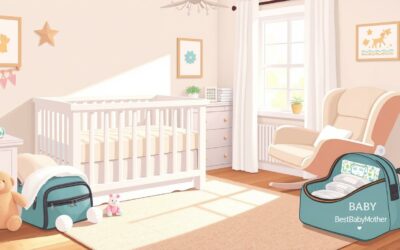Have you ever wondered what the most crucial steps are for ensuring your newborn’s health and happiness?
Starting your journey as a parent can be tough. But, with the right knowledge, you can give your baby the best care. Knowing how to keep your baby clean and safe is key.
Newborns need their diapers changed a lot, about 10 times a day. This keeps their skin clean and dry. How often to feed your baby is also important. Experts say to feed them every 2–3 hours to help them grow.
It’s also important for your baby to sleep a lot, around 16 hours a day. This helps them stay healthy. Knowing these things helps you take good care of your baby.
It’s not just about changing diapers or feeding. It’s about understanding your baby’s needs. Tips on how to handle these tasks can make a big difference.
Key Takeaways
- Newborns need frequent diaper changes, typically 10 times a day.
- Feeding should occur every 2–3 hours to ensure adequate nutrition.
- Infants require around 16 hours of sleep per day, often in short intervals.
- Maintaining proper hygiene and safe handling is crucial for baby health.
- Quickly responding to crying helps address the baby’s needs and fosters bonding.
How to Get Support After Bringing Your Baby Home
The postpartum period can be very tough. Having a good support system is key. Reach out to family, friends, or healthcare providers for help. They can make a big difference in those first weeks.
Listening to advice from those who know is helpful. But make sure anyone caring for your baby is healthy and vaccinated. This is important for your baby’s safety, as their immune system is still growing.
Building a support network is important. Many places, like hospitals, offer free car seat checks. This is crucial for your baby’s safety. The American Academy of Pediatrics also suggests that babies sleep on their backs to prevent accidents.
Getting your siblings involved in caring for the baby can help. It can make everyone feel closer and reduce stress for you.
Don’t be afraid to ask for help. The support you get can make a huge difference for you and your baby.
Handling Your Newborn Baby Safely
It’s very important to handle your newborn right. This helps them grow and stay safe. Learn the best ways to keep your baby safe and support their newborn immune system.
Hand Hygiene Importance
Keeping your hands clean is key to protecting your newborn. Their newborn immune system is still growing. Always wash your hands with soap and water before touching your baby. This helps keep them from getting sick.
Supporting Head and Neck
It’s important to support your baby’s head and neck. Babies usually get head control at 4 months. Hold your baby with their head in your arm’s crook and support their bottom with your other arm. This keeps them safe and prevents injuries like fontanelle damage.
Avoiding Shaky Movements
Never shake your baby. It can cause serious harm, like brain damage or even death. Babies under 12 months are especially at risk. It’s important to move them gently and safely.
Securing in Carriers and Strollers
Make sure your baby is safe in carriers and strollers. Use one that fits your baby’s age and weight. Always follow the maker’s rules to secure the straps right. Also, check that your baby can breathe easily.
| Handling Aspect | Importance & Safety Tips |
|---|---|
| Hand Hygiene | Vital for protecting the newborn immune system by preventing infections. |
| Supporting Head & Neck | Essential to prevent injuries; babies develop head control around 4 months old. |
| Avoiding Shaky Movements | Crucial to avoid brain damage and other severe injuries. |
| Securing in Carriers & Strollers | Ensures safety by preventing falls and ensuring comfort. |
Following these tips helps keep your newborn safe and happy. It’s all about creating a safe and loving space for them to grow. These steps are key to their health and happiness.
Bonding Techniques with Your Baby
Bonding with your baby is key for their growth. Activities like cradling and skin-to-skin contact, like *kangaroo care*, create a deep connection. This connection helps your baby grow socially and emotionally, reaching important developmental milestones.
Research shows babies are ready to bond right away. But, it takes time for parents to feel a strong bond.
Touch is like a language for babies. They grow well with skin-to-skin contact. Even the smell and touch of their mothers help during feeding.
Dads and partners can bond too. They do this through feeding, reading, singing, and mirroring.
Some parents might struggle to bond. This could be due to hormonal issues, tiredness, or postpartum depression. If you’re having trouble, talking to healthcare providers and other new parents can help.
Consistently showing love and care to your baby builds trust. This strengthens your bond.
Bonding is a personal journey that takes time. It doesn’t mean you’re not a good parent. For more tips, visit this resource.
Touching, cuddling, and talking release hormones that help a baby’s brain grow. Activities like talking and singing also help your baby’s brain. They reach important developmental milestones this way.
Bonding with your baby is the start of their trust in others. It’s a journey that grows over time.
Soothing Your Baby
There are many ways to calm a restless baby. Techniques like infant massage, calming sounds, and music help a lot. Baby swaddling is also great for comfort and sleep.
Infant Massage Benefits
Infant massage is very good for bonding with your baby. It makes them relax and grow better. Adding it to your daily routine can make your baby happier and sleep better.
Using Sounds and Music
Calming sounds and music are also great for soothing. Soft tunes and white noise can make a peaceful space. Try different sounds to see what works best for your baby.
Effective Swaddling Techniques
Swaddling is a classic way to keep your baby safe and warm. Learning how to swaddle well can help your baby sleep better. It feels like being back in the womb, which is very comforting.
| Soothing Techniques | Benefits |
|---|---|
| Infant Massage | Improves bond, reduces stress, enhances development |
| Calming Sounds and Music | Creates a serene environment, aids sleep, helps relaxation |
| Baby Swaddling | Provides security, reduces startle reflexes, promotes sleep |
Using these soothing methods every day can keep your baby happy and well-rested. This helps them grow healthy and makes your home a peaceful place.
Essential Diapering Techniques
Learning how to diaper your baby is key for their comfort and hygiene. Parents change diapers up to 3,000 times in a baby’s first year.
For girls, clean the genital area with warm water. Boys who are circumcised should use warm water for the first 3-4 days. Boys who aren’t circumcised need a soft cloth and warm water, but don’t pull back the foreskin.
Handwashing before and after diaper changes stops germs. Check your baby’s diaper after each feeding to prevent rash. Use warm water or mild wipes for the diaper area after bowel movements.
Keep the umbilical cord clean and dry until it falls off. Use warm water for cleaning, but don’t cover it with a bandage. If the cord looks red, has fluid, smells bad, or hasn’t fallen off by the third week, see a doctor.
Use petroleum jelly or zinc oxide diaper cream to treat and prevent rash. Avoid baby or talcum powder as they can irritate the skin and lungs. Keeping the baby’s skin dry is also important for rash prevention.
Here’s how to change a diaper:
- Get all needed items: clean diapers, wipes, cream, and extra cloth for boys.
- Put the baby on a safe, flat surface.
- Clean the baby with warm water or mild wipes.
- Put a new diaper under the baby.
- Apply diaper cream if needed.
- Secure the diaper.
- Dress the baby in clean clothes.
Nursing moms should change diapers right away to prevent rash. Good diapering keeps your baby happy and healthy.
Guidelines for Bathing Your Baby
Learning how to bathe your baby right is key. Start with sponge baths until the umbilical cord falls off, usually in one to two weeks. This helps avoid infections and helps the cord heal.
When your baby is ready for infant tub baths, follow safety rules. The American Academy of Pediatrics says to use 2 inches of water at 100°F (38°C). Also, keep your water heater at 120°F (48.9°C) to prevent burns.

Bath your baby three to four times a week. This keeps them clean without drying out their skin. Use gentle, unscented soap sparingly.
To treat cradle cap, put baby oil on the scalp after shampooing. Gently brush the hair and scalp the next day. Don’t use cotton swabs in your baby’s ears. And never pull back the foreskin if your baby is uncircumcised. If their skin is dry, use a bit of unscented baby moisturizer.
Always keep an eye on your baby during infant tub baths. Never leave them alone in water, as it can be dangerous. Don’t use bath chairs, as they can be harmful. Make sure the bath area is safe and everything you need is nearby for a calm bath time.
Caring for Umbilical Cord and Circumcision Area
Keeping your baby’s umbilical cord and circumcision area clean is key. It helps your baby stay healthy and comfortable. Here are important steps and tips for both areas to help you care for your newborn.
For umbilical cord care, keep the area dry and clean. Don’t cover it with the diaper. Instead, fold the diaper down to let it air-dry. Until the cord falls off, use sponge baths instead of full baths.
Circumcision care involves understanding the procedure and healing. The surgery takes 5 to 10 minutes. A plastic ring is placed on the penis, which falls off in 5 to 7 days. The incision heals in 7 to 14 days.
After circumcision, expect swelling, redness, and bruising. Clean the penis with soap and water 2 to 4 times a day. Use petroleum jelly-based cream on gauze during diaper changes to soothe the area.
For pain, acetaminophen like Tylenol® might be suggested. But, don’t give more than 5 doses in 24 hours without a doctor’s say-so. Mild tenderness is normal, with swelling going down in 4 days. But, watch for signs of bleeding or infection, which need quick medical help.
| Post-Circumcision Care Tips | Expectation and Healing |
|---|---|
| Clean with soap and water 2-4 times daily | Plastic ring falls off in 5-7 days |
| Apply petroleum jelly to gauze | Swelling resolves in 4 days |
| Don’t exceed 5 doses of acetaminophen within 24 hours | Healing completes within 7-14 days |
| Monitor for severe swelling, high fever, or excessive bleeding | Contact doctor if complications occur |
Following these care tips for umbilical cord and circumcision areas helps your baby heal well. It also keeps your baby’s hygiene in check.
Breastfeeding Tips for New Moms
Starting a good breastfeeding routine needs knowing about infant nutrition. Here are important tips for new moms to help them on their breastfeeding journey.

Frequency and Signs of Hunger
Newborns usually need eight to 12 feedings a day. They feed every two to three hours. During growth spurts, like at 2 weeks, 6 weeks, and 3 months, they may get hungrier.
It’s important to know when they’re hungry. Look for signs like rooting, sucking on hands, and being restless. These cues help you feed them on time.
How to Determine If Your Baby Is Getting Enough
Watching diaper activity is key. By the fifth day, a newborn should have six wet diapers and three bowel movements a day. Also, check their weight gain.
Breastfed babies gain 5-7 ounces a week after the first couple of weeks. Stool that’s soft and yellow after a few days means they’re getting enough milk.
Benefits and Challenges
Breastfeeding has many benefits. It lowers the risk of ear infections, diarrhea, obesity, diabetes, and SIDS. It also boosts IQ and reduces cancer and osteoporosis risks for moms.
But, there are challenges like latch issues, engorgement, or sore breasts. Getting help from lactation consultants is very helpful.
Using these tips can make breastfeeding better for both mom and baby. Good infant nutrition and lactation advice are key for a healthy start for your newborn.
Importance of Proper Sleep Training Methods
Using the right sleep training methods is key for your baby’s health. It helps them sleep better and lowers the risk of SIDS. This leads to happier nights for everyone in the family.
Newborn sleep patterns change a lot. But with sleep training, your baby can get into a regular sleep routine. By 4-6 months, most babies can sleep for six hours straight at night. By six months, they often sleep through the whole night.
Parents use many sleep training methods to meet their needs. Some popular ones are:
- Ferber Method
- Chair Method
- Fading Method
- Pick-Up/Put-Down Method
- Cry-It-Out Method
The Cry-It-Out (CIO) method is strict and some parents find it hard. But gentler methods like the Fading Method and Pick-Up/Put-Down Method are kinder. They need patience but are easier on babies and parents.
Research shows the Ferber Method is safe for babies’ emotional health. Babies who sleep well have fewer problems growing up.
It can take three to seven nights to see sleep training work. It’s important to pick a method that fits your baby and stick to it. Finding the right sleep training is crucial for your baby’s health and safety.
| Method | Approach | Duration |
|---|---|---|
| Cry-It-Out | Letting babies cry without responding | 3-7 nights |
| Ferber Method | Gradually increasing waiting time to respond | 3-7 nights |
| Chair Method | Sitting by the crib and gradually moving away | Varies |
| Fading Method | Gradually reducing parental intervention | Varies |
| Pick-Up/Put-Down | Picking up the baby until they are calm then laying them down | Varies |
Good sleep training is key for healthy newborn sleep patterns and preventing SIDS. Choosing the right method helps your baby sleep well during important growth times.
Ensuring Infant Safety at Home
Creating a safe space for your baby is key. This means setting up a safe sleep area, making your home childproof, and watching the nursery’s temperature and air. These steps help prevent accidents and make a cozy home for your baby.
Safe Sleep Environment
A safe sleep spot is crucial to avoid Sudden Infant Death Syndrome (SIDS). Always place your baby on their back in a crib or bassinet. Make sure it’s free of pillows, stuffed toys, and loose bedding. Cribs should meet current safety rules, avoiding old ones with drop-down sides.
Infants can get trapped and suffocate if their head or body gets stuck between the mattress and the crib sides. A simple, clear sleep area is safest and most comfortable for your baby.
Childproofing Tips
Childproofing your home is vital since babies start crawling early, around six months. Use baby gates at stairs and secure furniture to walls to stop it from tipping. Keep small objects, raw carrots, apples, hot dogs, grapes, peanuts, and popcorn away from your baby.
Medicines and cleaning supplies should be locked up to prevent poisoning. Check smoke alarms on every level, especially in sleeping and furnace areas, to keep your home safe.
Monitoring Temperature and Airflow
Keeping the nursery’s temperature and air right is important for your baby’s safety and comfort. The bath water should be between 96-100°F. Always check the water before bathing your baby, and keep the water heater at 120°F or less to avoid burns.
Make sure the nursery has good air flow and avoid overheating. Dress your baby in layers for comfort. The right temperature and air flow make a safe and cozy space for your baby.
FAQ
What are some essential tips for newborn care?
Caring for a newborn means keeping hands clean and handling them safely. It’s also important to feed them right and keep up with health checks. Creating a loving space is key for their health and growth.
How can parents get support after bringing their baby home?
Getting help from family, friends, or doctors is a big help. Being open to advice from others who have experience is also good. Make sure anyone touching your baby is healthy and has had all their shots.
What steps should be taken to handle a newborn baby safely?
– Always wash your hands before touching your baby to keep them safe.
– Hold your baby’s head and neck right to avoid hurting them.
– Never shake your baby, as it can cause serious harm.
– Make sure your baby is safe in carriers and strollers.
What are some effective bonding techniques with my baby?
Doing kangaroo care, cradling, and gentle stroking helps a lot. Skin-to-skin contact is also great. These activities help your baby grow emotionally and physically.
How can I soothe my baby effectively?
– Regular massage can help bond and develop your baby.
– Soothing sounds and music can calm them down.
– Swaddling right can make them feel comfortable and sleep better.
What are essential diapering techniques to keep my baby comfortable?
Clean your baby gently and use diaper cream to prevent rashes. Always wash your hands after changing diapers. Doing this keeps your baby clean and comfy.
What guidelines should be followed for bathing your baby?
Start with sponge baths and move to tub baths as they grow. Keep baths short and gentle to keep their skin healthy.
How should the umbilical cord and circumcision area be cared for?
Keep these areas clean and dry. Use gentle cleaning and follow wound care instructions to avoid infections and help them heal.
What breastfeeding tips should new moms know?
– Learn to recognize when your baby is hungry and feed them.
– Watch for signs that your baby is getting enough to eat.
– Breastfeeding has many benefits, and knowing how to handle challenges can make it successful.
Why is proper sleep training important for a newborn?
Safe sleep practices, like back sleeping, help your baby sleep well. This reduces SIDS risk and makes for peaceful nights for everyone.
How can I ensure my baby’s safety at home?
– Make sure the sleep area is safe from harmful things.
– Childproof your home to prevent accidents.
– Keep the nursery at a good temperature and airflow for your baby’s safety and growth.













